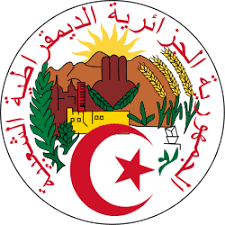Algeria
Algeria Home

Destination Algeria, a Nations Online country profile of the largest Maghreb state in North Africa, bounded by the Mediterranean Sea in the north. It borders Tunisia in the northeast, Libya in the east, Morocco in the west, Western Sahara, Mauritania, Mali in the southwest and Niger in the southeast. The country shares maritime borders with Italy and Spain.
Algeria has been the largest country in Africa since the partition of Sudan. It covers an area of almost 2.4 million km²; for comparison, it is four times the size of France or about 3.5 times the size of the U.S. state of Texas.
The Tell Atlas mountain range separates the narrow coastal plains along the Mediterranean from the southern desert. More than 80% of Algeria's landscape lies in the western part of the Sahara, the largest hot desert in the world.
Algeria has a population of 44.7 million people (in 2021). About 90% of Algerians live in the northern coastal area. The capital and largest city are Algiers, a seaside metropolis and the country's primate city. The official language is Arabic; French plays an important role as an educational, commercial and lingua franca. Tamazight, the language of the indigenous Berber, has been constitutionally recognized as a national language. According to the constitution, Islam is the state religion. Most Algerians, both Arabs and Amazigh, are Sunni Muslims.
Background:
Algeria's indigenous Berber people have been under foreign rule for much of the last 3000 years. The Phoenicians (1000 BC) and the Romans (200 BC) were the most important of these. With the incursion of Muslim Arabs in the 7th-8th century into the region, Islamic influence came to the Berbers and almost a millennium of domination by Arab dynasties.
At the beginning of the 16th century, the region was placed under the protection of the Ottoman Sultan of Istanbul. For more than 300 years, the country was reigned by Ottoman beys, pashas, and aghas. The Ottoman period ended with the beginning of the French colonization in 1830.
The French occupation condemned the Algerian population to economic, social, and political inferiority and sparked decades of armed resistance. After a century of rule by France, Algeria became independent in 1962, and Arabic became the official language - with a little help from Quran teachers from Egypt and Saudi Arabia.
Since then, le pouvoir ("the power"), an elite of business leaders and generals behind a democratic façade, has run Algeria.
Sign in to add your comment.
Suggested Pages
Official Name:
People's Democratic Republic of Algeria
Short form: Algeria
ISO Country Code: dz
Local Time = UTC +1h
Country Calling Code: +213
Capital City: Algiers (Alger, Algier)
(pop.) 3 000 000
Principal Towns: Oran, Constantine, Annaba, Blida, Setif, Sidi be Abbes.
Government:
Type: Republic.
Independence: 5 July 1962 (from France).
Geography:
Location: Northern Africa, bordered by the Mediterranean Sea on the north, Morocco, Western Sahara and Mauritania on the west, Mali and Niger on the south, and Libya and Tunisia on the east.
Area: 2.38 million km²
Terrain: Algeria consists of four regions: the mountainous coastal chain, plains and high plateaus, the mountainous chain of the interior, and the area of the Grand Sud with its mountainous solid masses.
Climate:
A Mediterranean climate in the north with mild, wet winters and hot, dry summers along the coast; drier with cold winters and hot summers on high plateaus; arid or desert climate for the country's extreme south. The Sirocco, a hot, dust and sand-laden wind, is especially common in summer.